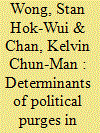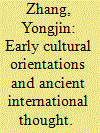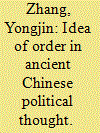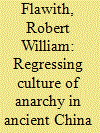|
|
|
Sort Order |
|
|
|
Items / Page
|
|
|
|
|
|
|
| Srl | Item |
| 1 |
ID:
178733


|
|
|
|
|
| Summary/Abstract |
Why would dictators purge members of their ruling coalition? Some argue that doing so can minimize the risk to dictators’ political survival, while others contend that dictators who mount purges are motivated by the desire to share resources with fewer allies. In this study, we analyze an original dataset, compiled from biographical data on the subordinates of the founding emperors of seven ancient Chinese imperial dynasties. Analyzing the data with competing risks models, we find that military experience is a strong predictor of political purges. Emperors were less likely to execute officers who had fought in more battles, but more likely to execute commanders, especially those who had established military credentials prior to the founding of an empire. In addition, the incidence of political purges heightened toward the end of an emperor’s life, which implies that the founding emperors were concerned about the security threats against their designated successors. Potential challengers came not only from the military, but also from the aristocracy. Indeed, we find that the blood relatives of the emperors were more likely to experience a mild form of purges: deprivation of titles. These findings suggest that dictators are more likely to use purges to reduce existential threats.
|
|
|
|
|
|
|
|
|
|
|
|
|
|
|
|
| 2 |
ID:
141222


|
|
|
|
|
| Summary/Abstract |
A short commentary on Martin Wight’s ‘The Disunity of Mankind’, a short and unfinished piece in which Wight focuses almost exclusively on the Western tradition of thought, from Plato and Aristotle, to the Stoics and to Augustine.
|
|
|
|
|
|
|
|
|
|
|
|
|
|
|
|
| 3 |
ID:
131421


|
|
|
|
|
| Publication |
2014.
|
| Summary/Abstract |
Is there any significant International Thought in antiquity beyond the West? If there is, why has there as yet been no meaningful conversation between the expanding enterprise of theorizing International Relations (IR) today and ancient Chinese political thought? This extended version of my Martin Wight Memorial Lecture addresses these questions through a critical exploration of how a pivotal idea in ancient as well as contemporary international relations, namely, the idea of order, is deliberated in ancient Chinese political thought. Inspired by Martin Wight's profound scholarship so steeped in historical and philosophical depth, it investigates why and how alternative visions of moral, social and political order are imagined, offered and debated in ancient Chinese philosophical discourse. It examines the ways in which the moral and political pursuit of order as a social ideal is conducted in the anarchical society of states in ancient China. Through these historical and philosophical investigations, this article seeks to establish that ancient Chinese political and philosophical deliberations are rich in international thought and that classical thinkers in China's Axial Age are alive to us and contemporaneous with us philosophically as much as ancient Greek philosophers are. In establishing such a claim, the article calls for, and issues an invitation to, a conversation between the world of thought in ancient China and the theorization of IR as an intellectual ritual in search of a truly international theory.
|
|
|
|
|
|
|
|
|
|
|
|
|
|
|
|
| 4 |
ID:
104985


|
|
|
|
|
| Publication |
2011.
|
| Summary/Abstract |
What does the qualitative increase in the brutality of international relations in the Eastern Zhou period of ancient China (770-221bc) mean for the implicit progressivism of Alexander Wendt's constructivism, as espoused in his landmark text Social Theory of International Politics (1999)? Wendt's constructivism is useful in understanding international systems outside the contemporary Westphalian order and provides an excellent analytical tool for understanding ancient China. However, this article argues that Wendt's implicit teleology of progressively cooperative 'cultures of anarchy' in international politics is empirically questionable. It is demonstrated that such a progression is not supported by the historical evidence of ancient China, which represents an instance of an international system 'regressing' from a more to a less cooperative international social structure.
|
|
|
|
|
|
|
|
|
|
|
|
|
|
|
|
| 5 |
ID:
130396


|
|
|
|
|
| Publication |
Boulder, Westview Press, 1993.
|
| Description |
xix, 568p.Hbk
|
| Contents |
B
|
| Standard Number |
0813312280
|
|
|
|
|
|
|
|
|
|
|
|
Copies: C:1/I:0,R:0,Q:0
Circulation
| Accession# | Call# | Current Location | Status | Policy | Location |
| 057696 | 355.020951/SAW 057696 | Main | On Shelf | General | |
|
|
|
|
|
|
|
|
|